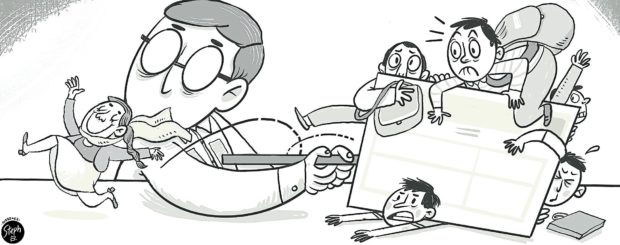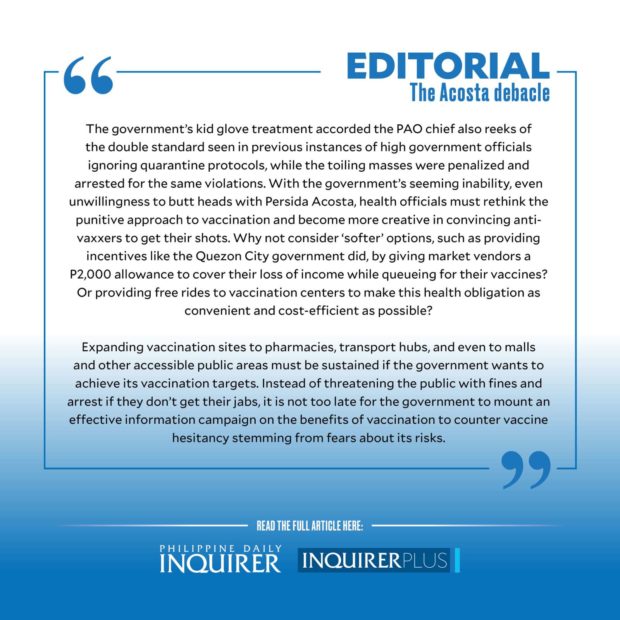So who’s afraid of the government’s “No vax, no ride” policy that restricts the movement of unvaccinated individuals in an effort to curb the spread of COVID-19?
Certainly not Persida Acosta, the chief of the Public Attorney’s Office (PAO), whose anti-Dengvaxia campaign during the Aquino government’s mass vaccination drive against dengue has been blamed for the drop in the country’s immunization rate and the subsequent re-emergence of polio in 2019.
In a television interview last week, Acosta said she had chosen not to be vaccinated due to her age and health issues. “I have second thoughts in getting vaccinated. I am waiting for a protein-based COVID vaccine,” she said, adding that she will fight local ordinances that penalize and restrict the movement of the unvaccinated.
The PAO chief cited Republic Act No. 11525 or the COVID-19 Vaccination Program of 2021, which provides that vaccine cards shall not be a requirement for educational and other purposes, as well as the Department of Health website, which states that people have the right to refuse vaccines or medicine. Acosta would not fault President Duterte for instructing the interior department to impose restrictions on the unvaccinated but stressed that officials should not violate the Bill of Rights in the Constitution.
While conceding that Acosta “has the legal right to refuse vaccination,” Justice Secretary Menardo Guevarra called on the official to obey government regulations to protect public safety. Health Secretary Francisco Duque III similarly appealed to Acosta’s good sense, citing her near-senior status and the need for her “to get additional protection through vaccination.”
But why coddle Acosta despite her flouting government regulation, asked Senate Minority Leader Franklin Drilon who said this was a “slap in the face of government.’’ Acosta should not be allowed to report for work as she could be spreading the virus among her co-workers. “The government should take the same hardline stance against (its) own officials. Set an example with Acosta,” Drilon said. “If the government is serious about its ‘no vax, stay at home; no vax, no ride policy,’ it should apply to all. Otherwise, it will not work,” he said.
The government’s kid glove treatment accorded the PAO chief also reeks of the double standard seen in previous instances of high government officials ignoring quarantine protocols, while the toiling masses were penalized and arrested for the same violations.
With the government’s seeming inability, even unwillingness to butt heads with Acosta, health officials must rethink the punitive approach to vaccination and become more creative in convincing anti-vaxxers to get their shots. Why not consider “softer’’ options, such as providing incentives like the Quezon City government did, by giving market vendors a P2,000 allowance to cover their loss of income while queueing for their vaccines? Or providing free rides to vaccination centers to make this health obligation as convenient and cost-efficient as possible?
Expanding vaccination sites to pharmacies, transport hubs, and even to malls and other accessible public areas must be sustained if the government wants to achieve its vaccination targets. Instead of threatening the public with fines and arrest if they don’t get their jabs, it is not too late for the government to mount an effective information campaign on the benefits of vaccination to counter vaccine hesitancy stemming from fears about its risks.
It would take more than just a controversial and restrictive policy to get people lining up for their jabs, a goal that would address the World Bank report on the Philippines lagging behind its regional peers in COVID-19 vaccination. “The slower vaccination and higher mobility during the holiday season are the likely causes why the Philippines is one of the first to experience an Omicron variant surge in the region, recording higher cases per capita than other Asean countries, as of Jan. 11,” said the report.
Banking giant Goldman Sachs also noted that the country only has a 54 percent vaccination rate as of Jan. 13, compared to China’s 90 percent, Singapore’s 89 percent, South Korea’s 87 percent, Vietnam’s 80 percent, Malaysia and Taiwan’s 79 percent, Thailand’s 73 percent, Hongkong’s 67 percent, India’s 65 percent, and Indonesia’s 63 percent.
With just over five months in office and with the national elections expected to grab resources and attention away from the pandemic, the Duterte administration has no time to lose and no reason to drop the ball. Even in the homestretch of its term, the government has the bounden duty to protect the health and safety of all Filipinos, even as it addresses the concerns of habitual naysayers in its ranks.



